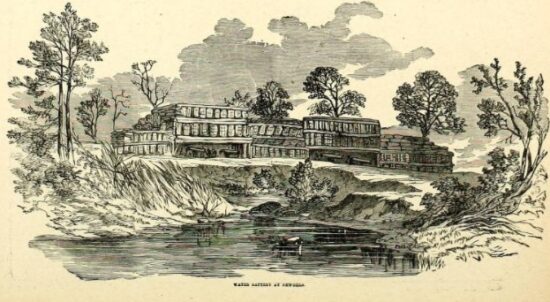George Kiskadden Interesting War Experiences
Narrow Escape #32
Ironton Register – June 23, 1887
Submitted by Peggy A. Wells
The Register man met George Kiskadden of Hanging Rock under peculiar circumstances on the 25th day of July 1864. Wandering about in the fourth story of an old mill that was used as a hospital at Cumberland, Md., where there were a hundred cots filled with wounded men, we encountered the face of a man we had seen before but could not place.
It was very pale and indicated a serious wound. Engaging the person in conversation, we found it was George Kiskadden of the 2nd Va. Cavalry and that he had been wounded on the 22nd of July. We asked him what boys from Lawrence county had been killed in those fights there, and he stunned me by naming his very questioner, whom he did not know, as being one of the killed, that he had seen the soldiers burying him, as he was carried by.
Upon being solemnly assured that he was agreeably mistaken as to the person killed and at the same time introducing yourself, his pale face changed into a broad grin. But we talked it over then and there and, in the next few days, visited his bedside often. His cot was only about twenty feet from that on which lay the gallant Capt. Crossley was trying to save his right arm, which was badly shattered by a bullet.
Mr. Kiskadden called at the Register office the other day, and these stirring scenes became the subject of the talk. His “narrow escape” lay in the nip and tuck of getting over that wound. Several times the doctors shook their heads and didn’t know “which way the — was going to jump,” as the saying is. It was a flesh wound on the left side, but it turned ugly.
“Refresh our memory on that little adventure of yours,” said we one-day last week.

“Well, the affair occurred near Newtown in the Shenandoah Valley on the 22nd of July, 1864. A squad of our regiment under Major Jerry Davidson had been sent as far as Middletown, and the appearance of a big force of rebels caused us to fall back to Newtown. Then, towards evening, we halted, threw out our picket, and started to make coffee— company A from the 3d Va. Union Cavalry passed by us towards the front, but it was not long before they came swooping back and getting out of there in a hurry.
The next thing I knew, we were nearly surrounded by the rebs. About that time, Gen. Averill and Powell came up with reinforcements, and we made a slight stand. A battery was planted on the hill near Newtown and opened out with a vengeance, but it did no good. Early’s army was in line and about to blot us out of existence.
I was on a hillside with the rest of our squadron, firing at the reb line. But the line was making it hotter for us than we did for them. The bullets rained around us. While thus engaged, a ball struck me in the side, and it struck so hard that for the moment, I was stunned and was about to fall from my horse when Lieut. Barber sprang forward and caught me.
He held me awhile and steadied me until I recovered from my fainting spell, and then I started for the rear. As I passed, I never saw the evidence of how thick the bullets could be until I beheld them striking the ground ahead of me, making little puffs of dust, just as one sees in a dusty road at the beginning of rain when the big drops fall. It seemed a wonder to me how any man escaped that storm of lead.
Poor Lieut. Barber got through that fight but fell two days afterward, in a gallant charge which the Register described in its interview some weeks ago. If it had not been for him on the day I was shot, I wouldn’t be here now to tell you the story.

0 Comments